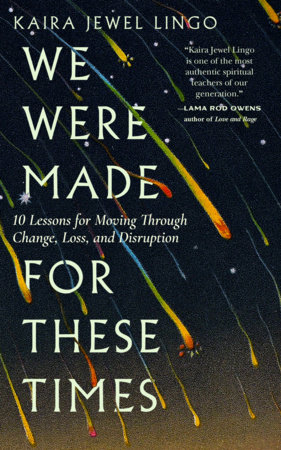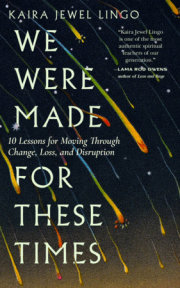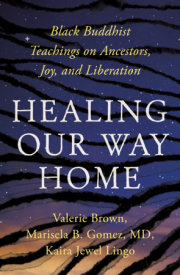All of us go through times of transition, challenges, and difficulties. We may have faced or will face times of loss, confusion, or heartbreak, when we realize we cannot control the way our life is unfolding, whether in our personal lives or in the world around us. With mindfulness, we can learn to move through these intense, challenging times in ways that don’t add to the suffering and difficulty that are already there. We can even learn to open our hearts to the richness and wisdom these times of immense disruption can bring us.
A key step that can help us begin to settle ourselves when we are profoundly unsettled is to come home, to ourselves, in this moment, whatever is happening. This is one way of speaking about mindfulness, or being present: coming home to ourselves. When we bring our mind back to our body we come home. We could consider this state as our true home. This home inside of us is a home no one can take away from us, and it cannot be damaged or destroyed. No matter what happens around us, if we can find this home inside of us, we are always safe.
When we touch this experience of coming home, it is like we have finally arrived home after a long journey. We experience a sense of peace and even freedom, no matter how confining the outer circumstances. Coming home to ourselves feels like belonging; it is a state that holds us and enables us to hold others.
This is so important because we can live our whole lives estranged from this home within ourselves.
My teacher Thay sums up his whole lifetime of teachings with one sentence: “I have arrived, I am home.” For him, the principal aim of mindfulness prac-tice is to experience that we have already arrived, here and now. There is nowhere we need to run to or be, other than right here in the present moment. And we experience ourselves at home, no longer looking for some refuge outside of us, in some other place or time, when we touch the truth that all that we long for and search after is here inside of us.
We can experience encountering this spacious and free place of our true home in unexpected moments as we spend more time tuning in to what is happening inside us and around us.
One morning when I was a novice nun, in slow walking after sitting meditation, I became very present and aware of every step. I began by being aware that as I was stepping with my left foot, I was at the same time step-ping with my right, because my left foot could not be without my right. And vice versa. Then I saw that my arms were also contained in my feet, so I was also step-ping with my arms. Then my hands, my stomach, brain, sense organs, heart, lungs. I was 100 percent with my body. I was tasting the earth with my feet, listening to it, looking at it, feeling it, knowing it, smelling it with my feet. My heart was loving it, my lungs breathing it in and out.
Then I turned my attention more towards the Earth and knew I was also walking on cool streams of water flowing under me, and hot, fiery liquid deep below, in the center of the Earth. I imagined walking on the feet of those directly opposite us on the other side of the planet. The soles of my feet touched the soles of a little baby taking tentative steps, and a pregnant woman, and an old grandpa. My feet touched the feet of a lonely iso-lated person, and someone carried away by hatred and anger. I was also walking on the feet of someone who was right then doing walking meditation and enjoying the present moment. I was one with those walking the Earth whose hearts were filled with love and peace.
If we’re not aware of what is happening in the moment because we are caught up in our thoughts or reveries, or in the grip of worry or other strong emotions, it’s as if we have left our house. If we stay away for a long time, dust accumulates and unwanted visitors may take up residence in our home. Things like stress and tension accumulate in our bodies and minds, and over time, if we don’t tend to them, they can lead to physical or psychological illness.
But the beauty of awareness is that we can always return home to ourselves. Our home is always there, waiting for us to come back. There are numerous ways we can go home to ourselves: by being aware of our breath, by being aware of body sensations or bodily movements, and by connecting with the reality around us, like the sounds in our environment. And when we come back home in these ways, we are able to take stock and survey the territory of our being, seeing clearly what parts of our inner landscape need more support, where we need to pay more attention.
It is especially tempting in times of transition and challenge to abandon our homes, to leave our territory, in search of answers, perhaps by worrying about what will happen in the future. This is precisely the moment when we need to return to the present moment, feel our bodies, and take good care of ourselves now. Because the future is made of this moment. If we take good care of this moment, even if it is very difficult, we are taking good care of the future.
It may also be hard to come home if we sense that unresolved pain has accumulated and we don’t want to face it. We may get into the habit of avoiding our home completely. We don’t want to be with those raw, unprocessed parts of our experience that are painful and may be quite scary.
If this is our situation, it is important to have compassion for ourselves for not wanting to return home to face these difficulties inside of us. And yet the only way we can heal them, move through them, and make our home a more cozy place is to turn towards them. As the teaching goes: “The only way out is in.” Or through.
The practices we will learn in this book will help us to have the courage to go back and put our house in order, and give us the tools to do so, so we can slowly learn to enjoy being back in our true home.
Copyright © 2021 by Kaira Jewel. All rights reserved. No part of this excerpt may be reproduced or reprinted without permission in writing from the publisher.





